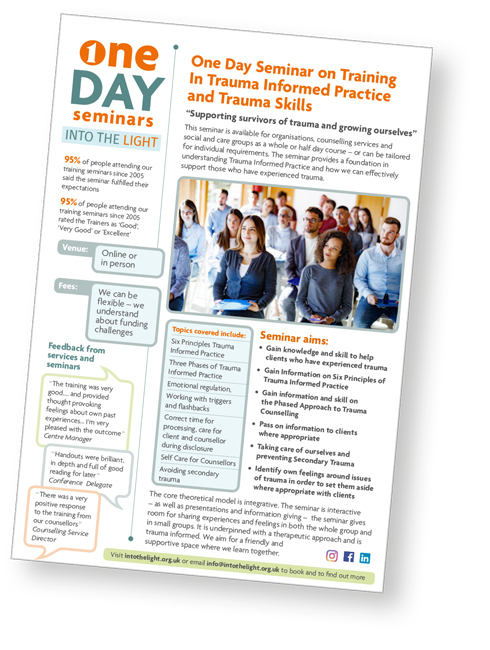

“Supporting Survivors Of Trauma And Growing Ourselves”
This seminar is available for organisations, counselling services and social and care groups as a whole or half day course – or can be tailored for individual requirements. The seminar provides a foundation in understanding the core issues around Trauma Informed Pracitise and how we can effectively support those who have experienced trauma.
Venue: Online or In-person
Fees: We can be flexible – we understand about funding challenges

You can view and download the Into the Light Adobe Acrobat A4 size pdf Training: Seminar on trauma informed practice and trauma skills flyer here.
Aims:
- Gain knowledge and skill to help clients who have experienced trauma
- Gain Information on Six Principles of Trauma Informed Practice
- Gain information and skill on the Phased Approach to Trauma Counselling
- Pass on information to clients where appropriate
- Taking care of ourselves and preventing Secondary Trauma
- Identify own feelings around issues of trauma in order to set them aside where appropriate with clients
Introduction:
How I came into this Work
Facts and Figures:
- Statistics on sexual abuse and domestic abuse in the UK
- What Is Trauma
Six Principles Of Trauma Informed Practice
- Looking in detail at the NHS Six Principles of Trauma Informed Practice
- What is working well for us today
- What we can build on in our practices
Three Phases Of Trauma Informed Practice For Counsellors
Phase One: Stabilization
- Flashbacks And grounding
- Regulating emotions
- Window of tolerance
Phase Two: Processing of Trauma
- Supporting Survivors during processing trauma
- Understanding the timing of processing is vital
- Supporting ourselves as counsellors during disclosure
Phase Three: Integration:
- Post Traumatic Growth – Positive or Pressure?
- Developing Self Compassion
- Reaching Out to others
Self Care For Yourself As A Professional:
- Avoiding Secondary Trauma
- Self care Suggestions
Questions and Answers and Checkout
- Reflecting on our time together